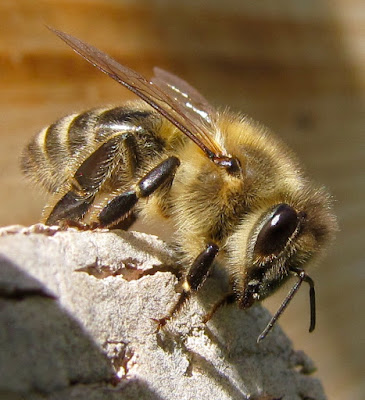It's been quite some time since a new post has been created for this blog. You see, I was busy with bees. Honey bees. I became a beekeeper in April 2015 and what an enriching experience beekeeping is. There have been stings, as well as honey, but mostly an educational experience while observing those tiny, all-important, and efficient creatures go about their business.
The only downfall to the two-year beekeeping experience is that I had no mentor. When considering such a hobby, find a mentor with at least five years of experience. The more experienced the beekeeper the better, and one whose experience is based in the same region where you will be setting up your hives. In my experience, after two full years of beekeeping, it seems about right that you'd really have the feel for what you're doing after five years.
This past winter was relatively mild and that may sound like a good thing for small creatures who live outside and do not hibernate. Extreme cold can claim the life of honey bees, but dampness is a bigger foe. Sadly, we lost our hive this winter. This was the second winter for the hive and surely, along with other factors, the dampness of the winter caused our girls to die.
The garden won't be the same without the pleasant buzzing sound emanating from and surrounding the hive; its exquisite scent; the high probability that our garden was pollinated entirely by honey bees from our hive; the chance to observe these marvelous winged creatures up close.
Starting over, I have a mentor! Two, in fact. In the fall, I met a woman whom I purchased honey from. She's a beekeeper (beek) in my town and has been a beek for the past five years. She keeps bees on another beeks property, who also resides in the same town, and is her mentor with twenty years experience. After spending only three hours with my mentor it was clear how much there is to learn to do better for our bees, once we begin again.
The plan is to mentor under the two seasoned beeks this year. Then, come next spring I'll be better prepared to care for my hive. I will also have my mentors to assist me along the way.
Seedlings for this years garden as growing strongly under grow lights. It'll be a diverse garden of tomatoes, hot & sweet peppers, carrots, beets, cabbage, eggplant, Romanesco broccoli, broccoli rabe, beans, melon, winter squash, cucumber, fennel, radish, potatoes, garlic, onions, herbs, lettuces, and flowers.
Happy Spring!
The only downfall to the two-year beekeeping experience is that I had no mentor. When considering such a hobby, find a mentor with at least five years of experience. The more experienced the beekeeper the better, and one whose experience is based in the same region where you will be setting up your hives. In my experience, after two full years of beekeeping, it seems about right that you'd really have the feel for what you're doing after five years.
This past winter was relatively mild and that may sound like a good thing for small creatures who live outside and do not hibernate. Extreme cold can claim the life of honey bees, but dampness is a bigger foe. Sadly, we lost our hive this winter. This was the second winter for the hive and surely, along with other factors, the dampness of the winter caused our girls to die.
The garden won't be the same without the pleasant buzzing sound emanating from and surrounding the hive; its exquisite scent; the high probability that our garden was pollinated entirely by honey bees from our hive; the chance to observe these marvelous winged creatures up close.
Starting over, I have a mentor! Two, in fact. In the fall, I met a woman whom I purchased honey from. She's a beekeeper (beek) in my town and has been a beek for the past five years. She keeps bees on another beeks property, who also resides in the same town, and is her mentor with twenty years experience. After spending only three hours with my mentor it was clear how much there is to learn to do better for our bees, once we begin again.
The plan is to mentor under the two seasoned beeks this year. Then, come next spring I'll be better prepared to care for my hive. I will also have my mentors to assist me along the way.
 |
| The beehive |
 |
|
Worker bee All worker honey bees are female |
 |
| Sipping water |
 |
|
Mostly females with two drones near the center of the photo. The drone's large size and compound eyes make them easy to spot. All drone honey bees are male. |
Seedlings for this years garden as growing strongly under grow lights. It'll be a diverse garden of tomatoes, hot & sweet peppers, carrots, beets, cabbage, eggplant, Romanesco broccoli, broccoli rabe, beans, melon, winter squash, cucumber, fennel, radish, potatoes, garlic, onions, herbs, lettuces, and flowers.
Happy Spring!





























































